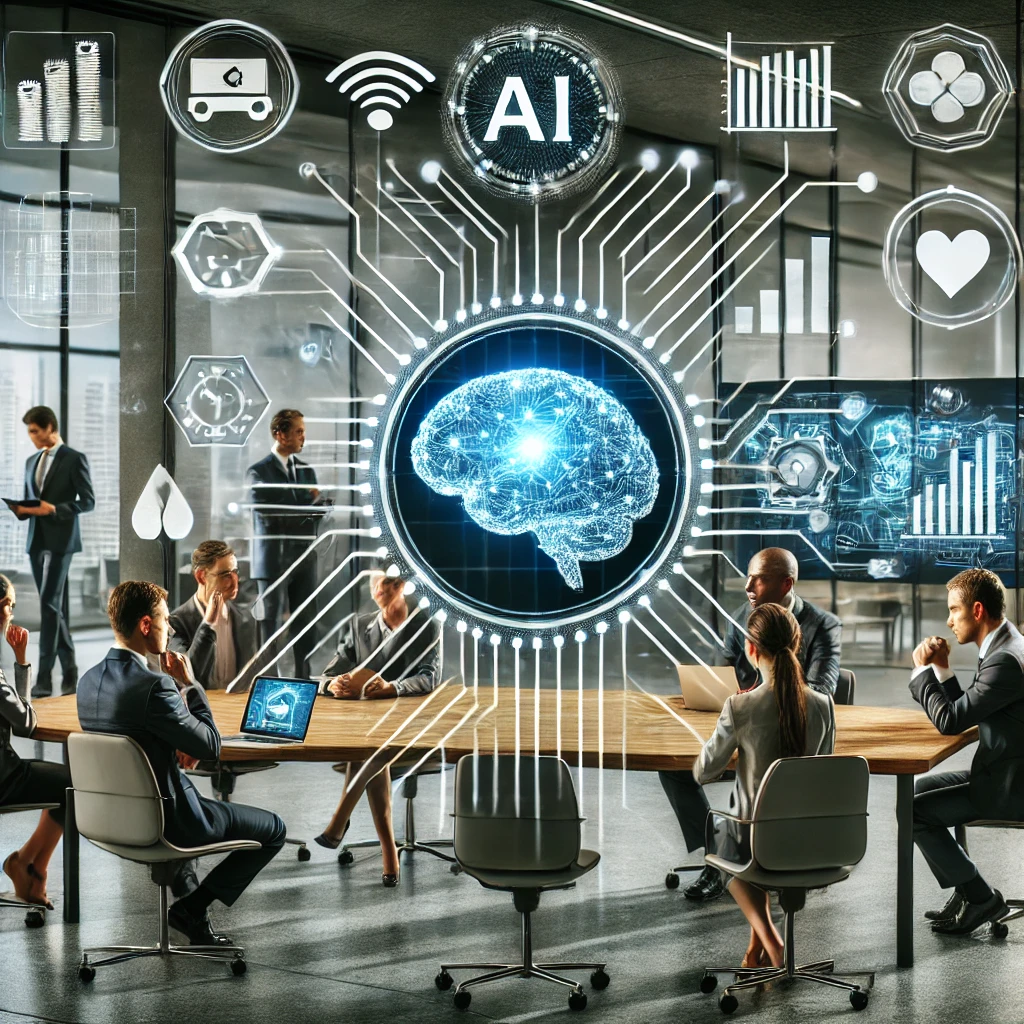Harnessing the Power of AI to Stay Ahead in Today’s Competitive Business Landscape
In today’s rapidly evolving business landscape, organizations are increasingly turning to Artificial Intelligence (AI) to gain a competitive edge. To boost your AI competitive advantage, it’s essential to understand how AI can enhance efficiency, drive innovation, and keep your business ahead of the curve. In this article, we’ll explore the transformative power of AI and specific strategies that businesses can leverage for sustained success.
Enhanced Decision-Making
AI competitive advantage is achieved by revolutionizing decision-making processes. Advanced algorithms and machine learning models can analyze vast amounts of data, providing businesses with real-time insights that lead to more accurate and strategic choices. For instance, AI-driven predictive analytics in finance can assess market trends and recommend investment strategies. Similarly, AI-powered systems in retail can optimize inventory management by predicting demand patterns. Click here for more on how AI is transforming decision-making
Personalized Customer Experiences
AI has redefined how businesses interact with their customers by offering highly personalized experiences. Customer data is a goldmine, and AI algorithms can sift through it to understand preferences, anticipate needs, and tailor interactions accordingly. This level of personalization fosters customer loyalty and differentiates a brand from its competitors. Chatbots powered by natural language processing (NLP) are a prime example, engaging with customers in real-time to provide personalized recommendations and enhance satisfaction. For more insights on how AI is changing the customer experience, read this article by Medallia.
Operational Efficiency and Automation
Automation, powered by AI, is a game-changer for operational efficiency. Tasks that were once time-consuming can now be automated, freeing up resources for more strategic activities. This not only reduces costs but also allows businesses to reallocate human talent to areas that require creativity and critical thinking. For example, AI-powered robotics in manufacturing can streamline production and minimize errors, while AI-driven virtual assistants in customer service can handle routine inquiries. Discover how AI-driven automation is boosting operational efficiency in this Harvard Business Review article.
Predictive Analytics for Proactive Strategies
AI’s ability to analyze historical data and identify patterns enables businesses to adopt proactive strategies. Predictive analytics can forecast market trends, anticipate customer demands, and identify potential risks, allowing organizations to prepare accordingly. For instance, predictive analytics in healthcare can forecast disease outbreaks, enabling timely interventions. Similarly, in marketing, AI algorithms can predict future trends, guiding businesses in developing products or services that align with market preferences. Learn more about the use cases of predictive analytics in this article from Smart Reach.
Streamlined Supply Chain Management
For businesses with complex supply chains, gaining an AI competitive advantage is essential. AI-driven tools can optimize logistics and ensure the smooth flow of goods and services, giving organizations the foresight needed to implement proactive measures. For example, AI can optimize inventory levels and enhance demand forecasting, ensuring that products are available when needed. This not only reduces costs but also improves customer satisfaction through reliable deliveries. Explore how AI is transforming supply chain management in this MIT Sloan Management Review article.
Competitive Intelligence and Market Insights
AI empowers businesses to gather and analyze vast amounts of data, providing valuable insights into market trends and competitor activities. This competitive intelligence enables organizations to stay agile and identify untapped opportunities. Social media monitoring, sentiment analysis, and trend forecasting are areas where AI excels in providing actionable market insights. By staying ahead of industry trends and understanding competitor strategies, businesses can make data-driven decisions that position them as leaders. Learn more about AI-driven market insights in this Dataconomy article.
Innovation and Product Development
AI is a catalyst for innovation, driving advancements in product development. Machine learning algorithms can analyze user feedback and identify emerging trends, fostering a continuous cycle of innovation. This ensures that businesses deliver solutions that not only meet but exceed customer expectations. For example, AI is instrumental in developing smarter software in the tech industry and accelerating drug discovery in healthcare. Explore how AI is fueling innovation in this excellent IBM article.
Cybersecurity and Risk Management
In an era where cyber threats are increasingly sophisticated, AI plays a critical role in enhancing cybersecurity. AI algorithms can detect anomalies, identify potential breaches, and respond in real-time to mitigate risks. This proactive approach is essential for safeguarding sensitive data and maintaining customer trust. For instance, financial institutions use AI to detect fraudulent activities, while AI-driven cybersecurity solutions continuously adapt to new threats. For an in-depth look at AI in cybersecurity, check out this World Economic Forum article.
Concclusion
Incorporating AI into your business strategy is no longer optional—it’s a crucial step for any organization aiming to lead, innovate, and thrive in today’s competitive digital landscape. From enhancing decision-making and personalizing customer experiences to streamlining operations and bolstering cybersecurity, AI offers a wealth of opportunities to gain a competitive edge. As the business environment continues to evolve, those who harness the power of AI will be better positioned to anticipate market shifts, respond proactively to challenges, and unlock new avenues for growth.
For more insights on how AI can transform your business, visit the Creative Innovation Group homepage or learn more about Julie Austin’s innovative work. If you’re interested in specific AI strategies that can provide a competitive advantage, check out our article on AI Driving Competitive Advantage. To delve deeper into the transformative power of knowledge and innovation, explore our article on Embracing a Broader Range of Knowledge for Creativity.
FAQ Section
Q: How can AI improve decision-making in business?
A: AI can analyze large volumes of data quickly and accurately, providing real-time insights that help businesses make strategic decisions. Predictive analytics, for instance, can forecast market trends and guide investment strategies.
Q: What role does AI play in customer experience?
A: AI enhances customer experience by analyzing customer data to personalize interactions, anticipate needs, and offer tailored recommendations. AI-driven chatbots can engage customers in real time, providing instant support and building stronger customer relationships.
Q: How can businesses get started with AI integration?
A: Businesses can start by identifying areas where AI can add value, such as automating routine tasks, enhancing decision-making, or personalizing customer interactions. Consulting with experts like Julie Austin can help create a strategic plan for AI integration tailored to specific business goals.
To learn more about AI’s impact and the strategies to harness its power effectively, contact Julie Austin today. She has the expertise to guide your organization through the exciting journey of AI adoption, ensuring you stay ahead in the competitive business landscape.

